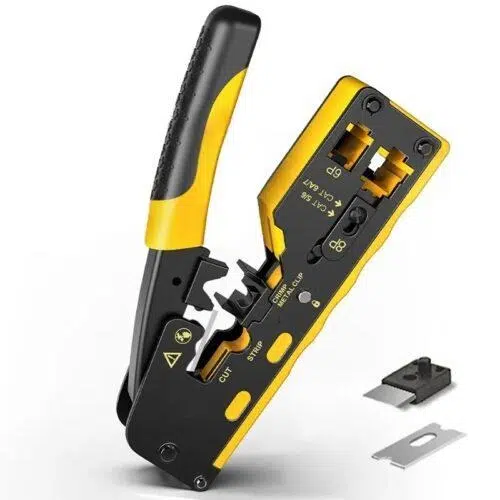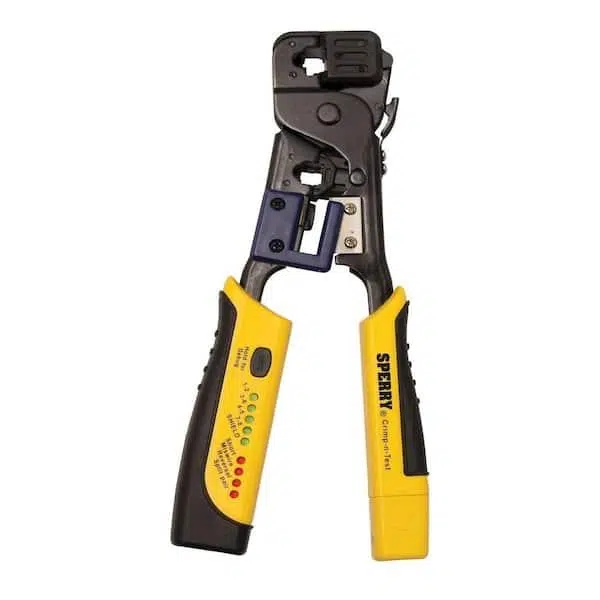Network Crimper Cabling Tool: The Essential Guide Leave a comment
Network Crimper Cabling Tool
In an increasingly digital world, the desire for fast, reliable connectivity is paramount. network professionals, IT enthusiasts, and DIYers alike have discovered that a reliable network crimper cabling tool is an indispensable asset in their toolkit. Whether you’re setting up a home network, installing a business cabling system, or pursuing a DIY project, the ability to create custom Ethernet cables can make all the difference.
In this comprehensive guide, we’ll explore the ins and outs of network crimpers, their benefits, practical tips, real-world case studies, and much more to help you understand why investing in a quality crimping tool matters.
What is a Network Crimper Cabling Tool?
A network crimper, often referred to as a cabling tool, is a specialized device designed to join (or “crimp”) connectors to the ends of networking cables, such as Ethernet cables. With a crimper, you can create custom-length cables suited for unique needs.
Common Types of Cables Used with a Network Crimper
-
- Cat5e: Supports speeds of up to 1 Gbps and distances of up to 100 meters.
-
- Cat6: Offers better performance and supports speeds up to 10 Gbps over shorter distances (up to 55 meters).
-
- Cat6a: Extends Cat6 performance further, supporting longer distances and higher frequencies.
-
- Cat7: Provides even better shielding for reduced interference, suitable for high-speed data transfer.
Benefits of Using a Network Crimper
Using a network crimper can provide several benefits:
1. Custom Lengths
-
- Flexibility: Create cables of any length, allowing you to adapt to your specific needs without excess clutter.
2. Cost-Effectiveness
-
- Savings on Cables: Instead of purchasing pre-made cables, you can save money by making your own.
3. Enhanced Performance
-
- Optimal Configuration: Ensures that your connections meet specific standards for performance.
4. Convenience in Repairs
-
- Quick Fixes: Easily replace damaged connectors or create new cables on the spot.
5. Professional Quality
-
- Reliable Connections: With the right technique, you can achieve professional-grade connections that perform optimally.
How to Use a Network Crimper: A Step-by-Step Guide
Using a network crimper might seem daunting at first, but with practice, you’ll find it straightforward. Here’s a step-by-step guide to help you through the process:
Materials Needed
-
- Network crimper
-
- Stranded or solid cable
-
- RJ45 connectors
-
- Cable tester
-
- Wire stripper
Step-by-Step Instructions
-
- Cut the Cable to Desired Length: Use a wire cutter to get the cable length you need.
-
- Strip the Cable Jacket: Use the wire stripper to remove about 1-2 inches of insulation from both ends of the cable.
-
- Untwist and arrange Wires: Untwist the pairs of wires, and arrange them in the correct order based on T568A or T568B wiring standards.
T568A:
– White/Green
– Green
– White/Orange
– Blue
– White/Blue
– Orange
– White/Brown
– Brown
T568B:
– White/Orange
– Orange
– White/Green
– Blue
– White/Blue
– Green
– White/Brown
– Brown
-
- Insert Wires into RJ45 Connector: Ensure that each wire goes all the way to the end of the connector.
-
- Crimp the Connector: Use the network crimper to press down firmly, securing the connector onto the wires.
-
- Test the Cable: use a cable tester to verify that the connection is correct.
HTML Table: cable Standards comparison
| Standard | max Speed | Max Distance | Use Case |
|---|---|---|---|
| Cat5e | 1 Gbps | 100 meters | Home networks |
| Cat6 | 10 Gbps | 55 meters | Gamer setups |
| Cat6a | 10 Gbps | 100 meters | Data centers |
| Cat7 | 10 Gbps | 100 meters | High-speed installations |
Case Study: Setting Up a small Office Network
One of our readers, Sarah, recently set up a small office network. Armed with a network crimper and some cables, she wanted to ensure all devices had a reliable connection.
After measuring the required lengths, she used the crimper to create multiple Ethernet cables, providing custom lengths that reduced cable clutter. Sarah reported that not only did she save money but also improved network performance, as the tailored cables eliminated potential signal degradation over longer, off-the-shelf cables.
Practical Tips for Using a Network crimper
Here are some additional tips to enhance your crimping experience:
-
- Practice on Scrap Cable: Before crimping critical cables, practice with scrap lengths to get pleasant with the tool.
-
- Check Compatibility: Ensure your connectors are compatible with the cable type you’re using.
-
- Use Quality Tools: Invest in a high-quality network crimper and connectors for the best performance and durability.
-
- Double-Check Connections: Always test your cables with a cable tester post-creation to confirm all connections are properly made.
First-Hand Experiences: Users Share Their Stories
Many network professionals and enthusiasts have shared their experiences with network crimpers. One seasoned technician noted how crimpers dramatically reduced his downtime when wiring up new installations. “Replacing a faulty cable only took minutes instead of waiting for new supplies,” he said.
Another user, a DIY home networker, exclaimed, “Creating my own cables was liberating! I never realized how simple it could be until I tried it. It felt great to customize everything to my specific needs.”
Conclusion
In a world were efficiency and reliability are key, investing in a network crimper cabling tool is a wise decision for anyone working with network installations. The ability to create custom cables not only saves money but also enhances performance and convenience.
By following best practices, utilizing the right techniques, and assembling the right materials, anyone can master the use of a network crimper. Whether you’re setting up a home office, launching a startup, or just dabbling in DIY projects, a network crimper will serve as a valuable addition to your toolkit. Embrace the versatility of custom cabling, and enjoy the benefits of a robust network tailored to your personal or professional needs.













